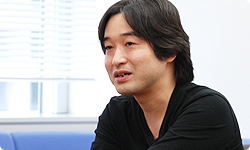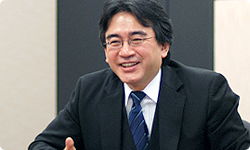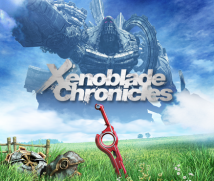4. A Vast World, Intricately Detailed
Takeda-san, since finishing work on the scenario, have you played the finished game?
Yes, I have. I actually played it very recently.
As you wrote the scenario, of course you are very familiar with everything about the game, its structure, settings and so on. When someone like yourself plays the game, what kind of impression do you get?
It sounds obvious, but when I was working on the scenario, that was my whole world. Then when I actually came to play the game, I’d see all these elements that had grown out of the main story, things that hadn’t been in the scenario, such as the overall atmosphere, the villagers’ appearance and so on. I felt like I’d written a huge volume of material, but it actually only amounts to one section of this vast world. I found that really overwhelming.
So even the scenario writer was overwhelmed! (laughs)
Yes, I was. For instance, there’s an area called Colony 9 . The sheer scale of it is incredible. When I was working on the scenario, I had in mind the type of village that appears in regular RPGs. But then when I actually came to play the game, I found that this single village had so many ideas put into it that it could have made an entire game in itself. That’s why, as we neared the end of the development process, it was really brought home to me just what a monumental project I had been involved in.
I see. Now, generally speaking, one finds that the bigger the game world gets, the less detailed it becomes. But with this title, you were looking for a world that was ‘both vast and intricately detailed’, weren’t you, Takahashi-san?
That’s right. I wanted to make it so that even if you went to the far edge of the map, you wouldn’t find it empty. I wanted to ensure that wherever you went, there would be something there waiting for you, be it something you’d been seeking, a quest , or a fearsome monster . In certain places, I also wanted to have secluded spots where players would think: ‘Wow, there are beautiful areas like this here in this world!’
So in other words, you made sure the player’s investment in the game would always be repaid.
Yes, and that’s why the number of items you can gather on a quest ended up reaching an absolutely huge total. The staff in charge of a quest would say that they’d make 400 items, and I’d make sure they knew what they were doing: ‘Are you really sure you can make that many?’

You almost want to say: ‘Somebody, stop!’ (laughs)
Yes, absolutely. (laughs) It’s supposed to be my job to put the brakes on, but when I saw how committed the team were, I’d go from questioning whether they could really do it, to saying: ‘You have to do it. Failure is not an option...’
(laughs)
I’d say that, and my staff would reply: ‘No problem. Keep pushing us!’ And so I’d say: ‘Alright then, I will!’ (laughs)
It sounds like you and the team were provoking each other and it kept escalating! (laughs)
But in the end, the team were able to get everything done, and didn’t leave anything out. So I told them they’d done well! (laughs)
So you started off wanting to put the brakes on, and ended up saying how well they’d done! (laughs)
Right. That feeling that maybe someone should apply the brake wasn’t just limited to that aspect of the game. It happened in a lot of areas. For instance, during battles the companions in your party shout out all kinds of things to each other , so it gets very noisy.
Although it’s a single-player game, you don’t feel alone, and it really feels like you’re fighting alongside your allies.
Exactly. And what’s more, if you mess up, your companions won’t criticise you and ask you what on earth you’re doing. Rather, they’ll always praise you.
They’ll praise you even if you mess up? (laughs)
That’s right. In addition, they’ll encourage you and tell you not to be downhearted. We did this so that the player would feel that their companions were really looking out for them.
With so many lines of dialogue, I’m guessing that recording must have been really tough.
Well, yes. To be honest, I felt that I had too much. We had so many lines that, even if we did a very long recording session, you’d still feel that you had so much more left to do. But then when I brought what we’d recorded back to the office and handed it to the person in charge, I’d say: ‘We went to the trouble of recording all of these lines, so you’d better use them. Failure is not an option.’
That sounds a lot like a provocation! (laughs)

(laughs) But then when all of this content was actually put in the game, some people thought that the characters were talking too much and that it was annoying. So at the very end, I had that adjusted. But I think that it will resonate with a lot of players when they see their companions giving their all alongside them in battle, kicking up quite a din.
But in any case, the game has ended up with a physical scale and intricacy of detail that was enough to make you feel you should have put your foot on the brakes at some points. How did you end up feeling about all this, Takahashi-san?
Without question, of all the games I have worked on, this is far and away the largest in terms of scale. But – and I realise this will sound strange – while making it, there were aspects that were extremely easy.
You mean that you found them easy?
Yes, that’s right. Well, I had Takeda-san working as my partner on the scenario, and I had complete faith in him. In addition, it’s exactly a decade since Monolith Soft was founded, and so we’ve trained up staff I can really trust.
So you’ve trained staff inside the company who can be left to take care of all manner of tasks.
That’s right. For the most part, it was fine to entrust tasks to individual members of staff, and there were plenty of times when I didn’t have to look over their shoulders. Thanks to that, I was able to focus my energies where I’m most effective. So while this was a huge and challenging project, in terms of my feelings about it, I’d go as far as to say that it’s the first time I’ve worked on something that proved to be such plain sailing.
Although your previous titles weren’t on the scale of this one, there were times when you were solely responsible for pulling large projects together, and you had to give everything you had.
Yes, that’s true. After founding the company, I started by employing a team, and there were times when most of them would have been inexperienced.
With this project, it’s ten years since the company was founded, and you’ve steadily trained your staff up and got to know them well. It seems to me like a range of people, each with their own specialist field of expertise, have been a great help to you as executive director.
That’s correct. This was a project where I was fortunate enough to have the assistance of a whole range of people. Previously, I would have been forced to expend energy wastefully. This time round, this didn’t happen at all. All of the team members gave their all in their area and while we managed to make a vast world, we were also able to make it richly detailed. I think it’s a fitting tribute to our first decade at Monolith Soft.
